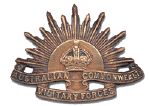 |
| Category: Army
History/WW2 |

|
This page is a
sub-category index |
|
|
|
|
The Book of Melanesian Pidgin English by
Capt. John J Murphy (with additions) |
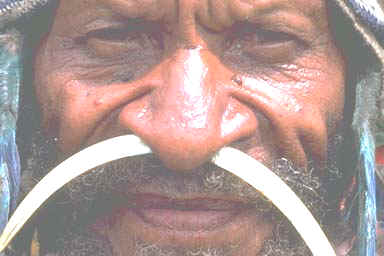 |
Subcategory Index
|
|
PNG has over 800 Languages! PNG is called
"The Land of the Unexpected" with good reason. Most people you
meet will speak three languages, and many people will speak 4, 5, 6, or
7!
Pidgin is spoken in most areas. Tok
Pisin, or Melanesian Pidgin, is
one of the three national languages of Papua New Guinea. It is the most
widely used language in the country, along with English and Motu. |
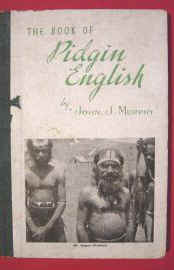 |
THE BOOK OF PIDGIN
ENGLISH
was written by Captain John J
Murphy (Dept. District Services and Native Affairs) and Registered at
the General Post Office Brisbane for transmission through the post as a
book.
Wholly set up, printed and
published in Australia by W.R. Smith & Paterson Pty Ltd., Kemp
Place, Valley Brisbane 1943.
|
Webmasters note. The author
has done a great job of recording the language. What he has not fully
explained is the relationship between the Pidgin words and an almost
child-like Australian version of English.
I think it's fair to say that he didn't have to as in
1943 his audience was 99% Australian with a close understanding of the
Australian dialect and jargon. Now that his work is being offered to an
international
|
| audience
it might be best if some explanation is made. For example: BUGARAP is
translated to "break, become impaired, have an accident" etc.
That is correct, but the root of the word is the Australianism
"Bugger up".
In the same way BARATA is given as "relative of
same generation "etc which is correct but it's root is
"brother". BIKKAMPANI is rooted in Big Company. PELA is rooted
in "fella" (Australianism for man or male) so BIKPELA is
"Big fella" as well as the given "large, big, important,
great, huge. BIKPELA does not have to be human, so a "bikpela
pukpuk" is a large (or big fella) crocodile. |
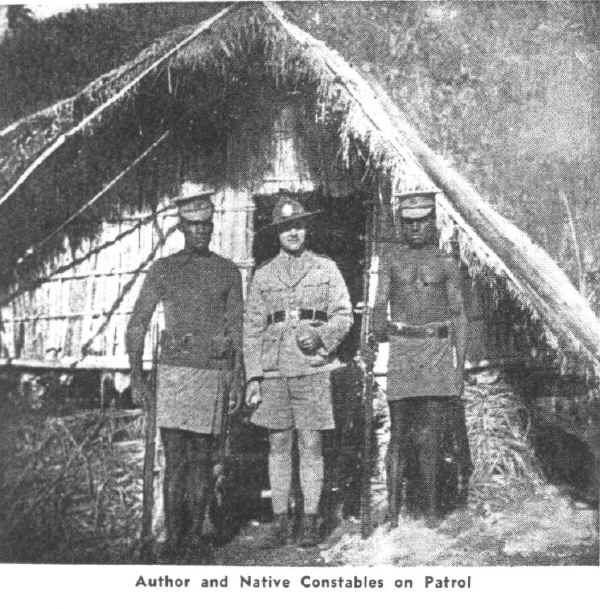 |
|
Foreword
|
|
Captain John J. Murphy has asked me to write a foreword to "The Book of Pidgin English."
When Civil Administration ceased in New Guinea early in 1942, that fine body of men who belonged to the field staffs of the Territories was absorbed into the Australian Army and formed the backbone of the Australian New Guinea Administrative Unit. Captain Murphy was one of these and has latterly performed sterling and gallant service in the immediate vicinity of the enemy.
As a newcomer to the land where Pidgin English is spoken I find Captain Murphy's book intensely interesting. He shows by examples the adaptability of the language (who else would have thought of rendering one of Shakespeare's choicest morsels in Pidgin!), and wisely warns the beginner of the difference between true Pidgin English and "broken" English.
The book might be regarded as a standard work upon what has been a most controversial subject, and it forms a useful guide for those dealing with natives in the areas where Pidgin English is the lingua franca.
I have been informed by others that the labour involved in collecting material for the book has, over many years, occupied the all too few spare hours of a conscientious Patrol Officer. No doubt for Captain Murphy it was a labour of love, yet any success that the book achieves will be richly deserved.
I wish Captain Murphy and his book the best of luck.
BASIL MORRIS, Major General, G.O.C. ANGAU. Port
Moresby,
September 1943 |
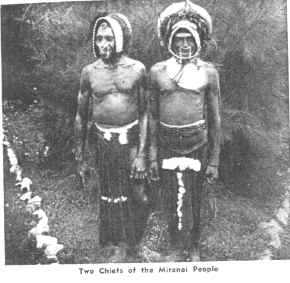 |
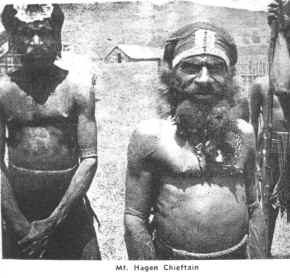 |
|
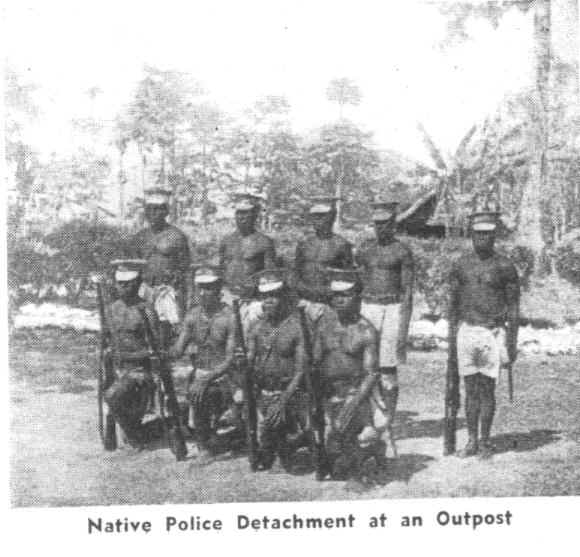
|
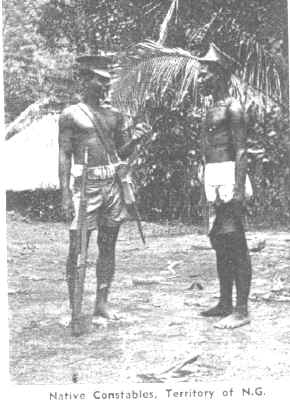 |
Preface |
| No attempt has been made, up to the present, to compose or standardize Melanesian Pidgin-English, and no book of reference Is available to those who desire, or whose work make it necessary, to have a good knowledge of Melanesian Pidgin-English.
Hence this book, which was undertaken as a step towards the classification of Melanesian Pidgin-English and its reduction to measurable and grammatical terms; also to stimulate, perhaps, worthier and more competent lexicographers to undertake the task of stabilizing the
most widely (numerically and geographically) spoken language In the Territory of New Guinea.
The system of orthography is discussed under the section devoted to spelling.
It must not be supposed that all natives are good
Pidgin English speakers. |
On the contrary, many of them make
grammatical and phonetic errors and the size of the vocabulary varies with
individuals. It is possible that some natives are conversant with all the words defined in this book, but the average vocabulary of the sophisticated native is about nine hundred words.
Localized native words, broken English and English words tricked out in Pidgin-English form have, of course, been omitted.
A great deal of labour and research was spent in producing this book, and it is sincerely hoped that it will be a useful guide
and book of reference to those who constantly use Pidgin-English as a
medium of expression.
John J. MURPHY, Department of District Services and Native Affairs. |
|
Apologia |
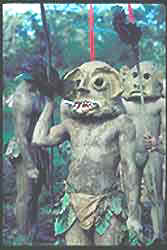 |
Pidgin-English is a true Melanesian language of
adaptability and facility.
It has a synoptic vocabulary of over 1,300 words and through them it is possible to translate about
4,000 words-more words than the ordinary Englishman is familiar with.
<<<
Asaro Mudman from the Eastern
Highlands
The vocabulary is derived almost exclusively from English. But many of the words have
lost the meaning of their etymons, and pronunciation has changed considerably. It is a common barbarism to give some English words the meaning of their etymons.
|
For example, kill is frequently translated as "kilim," and "shove" or "
push" as "pusim".
To learn Pidgin-English, one must approach it as one would approach language, French, German or Esperanto.
Unhappily the transient tourist, learned, no doubt, in his several
Departments and even some of our ablest residents, castigate Pidgin-English as a hopeless,
complicated and unsatisfactory medium of expression. Unfortunately they are
judging the language on their own highly fictitious knowledge of it. It
is unfortunate that the antipathy and prejudice against Melanesian
Pidgin-English is not directed against the painful jargon of broken Sonorous twaddle which too many pass off as Pidgin.
We are safe in saving that some thirty per centum of the friction between master and servant is due to
the failure of the former to learn the language of the Territory.
There are others again with only a rudimentary knowledge of the
language who declare it is limited, inadequate and given to
ambiguity. This is a comfortable fallacy that is to be deprecated, for Melanesian
Pidgin-English is a most facile language, capable of embracing any subject. It is quite as exact as any native language and more adaptable. As for ambiguity-it mainly exists in the mind of the English speaking white man.
Of course there are things outside the experience of Pidgin-English and for which there is no vocabulary. We speak of the sciences and philosophies and, to a certain extent of the trades, with their technical terms. But this is natural as languages and vocabularies are largely a matter of contact with knowledge and discoveries, of mental experiences, and of physical experiences.
It is true that Melanesian Pidgin-English has its deficiencies and failures. But so has any Melanesian language; and to no less extent. For the Melanesian languages form a comparatively early stage in language development. The advantages of Pidgin-English, however, far outweigh its disadvantages. It is easy to learn for both native and European; it is adaptable; it follows the mode of thought of the Melanesian; and it is universal in the Territory.
English is too difficult for the native and accessible to only a few. Yabim and Kotte are taught in only a few mission
schools are geographically and numerically limited; are little used outside the school and church; are not readily learnt by the white man; and they tend to give rise to jealousies towards the natural Yabim and Kotte speaking tribes. A native language is out of the question for the same reasons that apply to Yabim and Kotte.
In fact, the only argument against Pidgin-English is an unreasonable and unreasoning antipathy towards it from a number of the white population. |

|